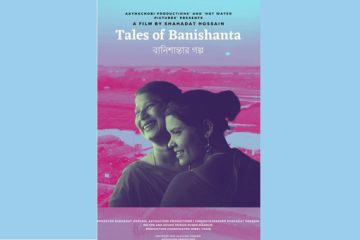Movie Review
“Proshnobodhok”: Trifling with trafficking
Dr. Habibul Haque Khondoker
 The telefilm “Proshnobodhok” is a love story presented in a sensitive manner by Adnan Al Rajeeb, a young director who also wrote the heart-warming screenplay. The romantic tale however clouds the purported theme of the film: the hazards of human trafficking.
The telefilm “Proshnobodhok” is a love story presented in a sensitive manner by Adnan Al Rajeeb, a young director who also wrote the heart-warming screenplay. The romantic tale however clouds the purported theme of the film: the hazards of human trafficking.
Tisha in “Proshnobodhok” is the antithesis of her role in Mostafa Sarwar Farooqui’s highly acclaimed film “Third Person Singular Number” where she is a target of sexual exploitation in a patriarchal society dominated by uncontrolled testosterone charged men unregulated by social norms.
The young director in his debut film is in his element in depicting the sequences of romance, courtship and unorthodox dialogue, typical of lovebirds who like to dabble in the meaning of life and death. There is a touch of Woody Allen-esque pop philosophising about death in the story. Yet the plot, taking in its entirety is riddled with inconsistencies and flaws.
A film of this genre, which is a docudrama on the subject of human trafficking needs accurate facts of this serious problem. It is only in the last 15 minutes or so of a 75-minute film that the audience gets a clear idea that the young man, the main male character of the film, is hell bent on going to Italy to acquire sufficient wealth so that he can marry his sweetheart on his return.
Here the story becomes somewhat inconsistent. The object of his affections (also named Tisha in the film) in fact does not want him to go anywhere and presents sensible alternatives to him such as completing university or finding a job. It is not clear why the young man played superbly by Arefin Shuvo does not heed such good suggestions. Even Tisha’s parents do not put overt pressure on the boy to leave the country to build a fortune.
There are other flaws. If one were to judge the economic station of the family from the indoor shots of the living room, one would place them as middle class and would expect their reservations about a suitor who is a stranger. But this sequence is not handled well, especially, the absence of the mother from an important event does not make much sense.
The other inconsistency of the story is that although the victims of human trafficking come from varied backgrounds, university students, especially from prestigious Dhaka University are less likely to be soft targets. They are, in fact, an informed bunch in this day and age of internet. The fact that two young men did not check their tickets and passports also defies logic.
Finally, the main weakness of the plot is geography. Why would one go to Dubai to go to Italy? To begin with, the United Arab Emirates where Dubai is located is a difficult place to enter. Outfitted with eye-scanning device at the port of entry, the surveillance is state of the art. Besides, the UAE has taken a lead in fighting human trafficking in recent years. However, the country is not free from the menace of human trafficking. The bulk of the victims of human trafficking in the UAE — as far as published researches show, are women. And for them the destination is the UAE itself. The transit points for human trafficking to Italy and other European countries ie. Spain are North African countries. Previously, East European countries were the transit countries. Those who are trafficked into Italy are often taken by boat from across the Mediterranean Sea. Many of them brave an extremely perilous journey.
In the story the unfortunate young men having been duped to go to Dubai instead of Italy, being their long journey to Italy by road (yes, by road). In an ideal world without borders one could probably think of that unthinkable. But in reality, the world is bordered, patrolled and guarded.
A very basic knowledge of geography and politics of the region would have saved the young writer from such a weak plot.
Dr. Habibul Haque Khondoker is Professor of Sociology at Zayed University, Abu Dhabi, UAE.

